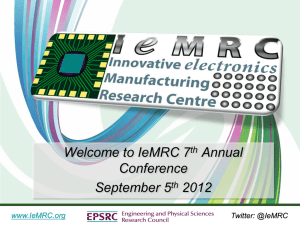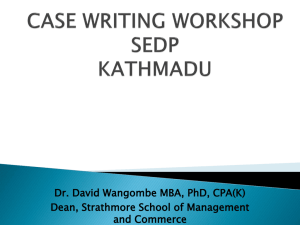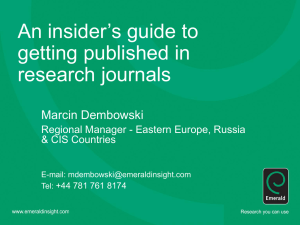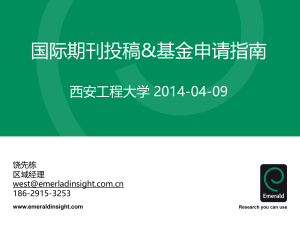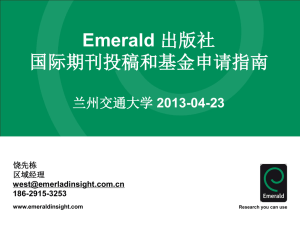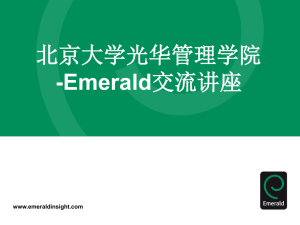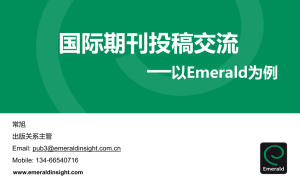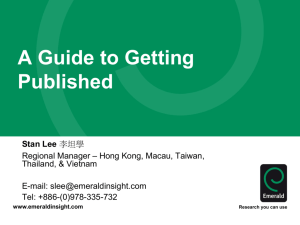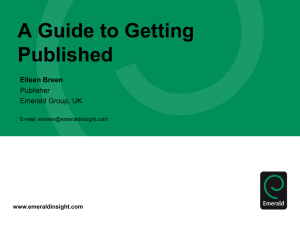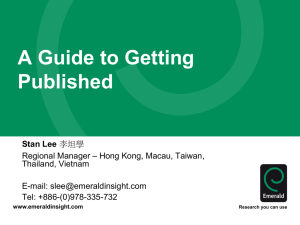Writing Teaching Cases for Publication English
advertisement
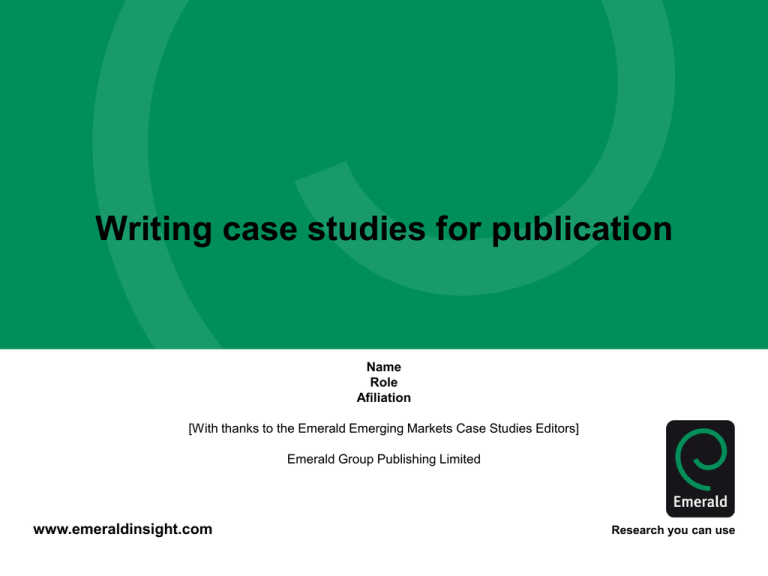
Writing case studies for publication Name Role Afiliation [With thanks to the Emerald Emerging Markets Case Studies Editors] Emerald Group Publishing Limited www.emeraldinsight.com Research you can use Agenda • Key steps • Differences between teaching/learning and research cases • Writing and structuring a case • What makes a good case and common mistakes • Copyright and plagiarism • After submission • Resources Emerald Group Publishing – company background • Emerald Group Publishing Limited • Founded in 1967 in Bradford, West Yorkshire • For academics by academics Emerald Group Publishing – company background Teaching/ Learning Case Studies and Emerald • Emerald Emerging Markets Case Studies collection – a welcome addition to our emerging markets content. • 150 + peer-reviewed teaching cases from and about the world’s most exciting economies. • All Business and Management disciplines covered. • Partners include: CEEMAN; AIB MENA; AABS. • EEMCS authors enjoy wide international dissemination: 11000+ downloads in the first year. • Main publishing contact: Victoria Buttigieg vbuttigieg@emeraldinsight.com • “We are really grateful for the comprehensive and thorough review of our case.” [From authors currently in the review process] Keep the key steps in mind 1. Learning/ Research Objectives. 2. Identify Case Lead through documents, interviews, observations. 3. Establish which documents/ people you will need access and gain access. 4. Collect information on case through further documents, interviews, observation. 5. Write case and get permission to publish. 6. Write the Instructor/ Teaching Notes. Try out the case to see if there is enough information. Teaching Cases and Research Cases Teaching/ Learning Cases: – facilitate training, knowledgesharing – have a story line that group can get immersed in and relate to – highlight practical applications of theory – reflect the ambiguity of the situation and need not have a single outcome, the intent being to create a dialogue, encourage critical thinking and lead to research and evaluation of recommendations. Research Cases: – An in depth look at a particular situation, event, entity. – A methodology used to inform quantitative research findings/ identify areas where more quant is needed. - Associated with qualitative research, ethnography, field study, and participant observation Teaching Cases and Research Cases (cont…) In both cases you should: – Have a case study protocol (after Robert K. Yin) – Collect relevant information from your case organization or case lead. – Ensure you have correct documentation. – Get permission letters. Considering co-authorship Where to find a co-author • Supervisor or colleague • Conferences • Publications • Emerald Research Connections Benefits • First time authors • Demonstrates the authority and rigour of the research • Especially useful for cross-disciplinary research Considering co-authorship Tips • Ensure the manuscript is checked and edited so that it reads as one voice • Exploit your individual strengths • Agree and clarify order of appearance of authors and the person taking on the role of corresponding author • Distributing work • Leader • Extending your work Writing the case • Past tense • Identify and establish an issue/problem which can be used to teach/ explore a concept or theory • The opening paragraph : – – – – WHO is the main protagonist? WHO is the key decision maker? WHAT is the nature of the issue/problem? WHEN did the case take place? Specify the date line in this paragraph. – WHERE did the case take place; what organization? – WHY did the issue/problem arise? Writing the case • Body of the Case – Tell the whole story - usually in a chronological order – It typically contains general background on macro environment, organisational background, and the details of the specific issue(s) faced. – Tell more than one side to the story so that learners can think of competing alternatives. • Concluding Paragraph – Provide a short synthesis of the case to reiterate the main issues, or even to raise new questions. What makes a good teaching/ learning case? 1. Should be a case not a story 2. Should tackle a relevant and important issue 3. Voyage of discovery 4. Controversy 5. Contrast and compare 6. Currently useful generalizations 7. Data to tackle not solve the problem 8. Personal touch 9. Well structured and easy to read 10. Pertinent topic Reference: “What makes a good case” by Prof. Derek Abell, Professor Emeritus, ESMT Common mistakes - teaching case • Written as a research article not a case • Submitting a case that has never been tried out on learners • “Taking sides” • Including analysis and lessons learned • Not following instructions – author guidelines. • Lack of fit (‘why was it sent to this collection’?). • Case does not adequately suit the teaching/ learning objectives it sets out to achieve. • Lack of permission documentation from organisation. What makes a good teaching note 1. Case synopsis 2. Target audience 3. Clear learning objectives 4. Suggested session time, broken down by topics 5. Suggested student/ learner assignment 6. Brief description of the opening 10-15 minutes 7. Challenging case discussion questions with sample answers 8. Brief description of the closing 10-15 minutes 9. If applicable, an update of “what actually happened” 10. Supporting material – worksheets, links to videos, readings, reference material, etc. Common mistakes - teaching note • Teaching the case requires additional information • 90 minute teaching plan supported by a one page Instructor Note • Suggested answers are not supported by the case • Learning objectives – applying a model without a purpose. • No sample answers • No analysis or lessons learned Example of author guidelines http://www.emeraldinsight.com/products/new/pdf/author_guidelines.pdf Plagiarism and referencing • Plagiarism is hard to detect with peer review but there are new tools to help us • Emerald’s entire portfolio is included in iThenticate web-based software from iParadigms http://www.ithenticate.com/ • Emerald’s Plagiarism Policy can be seen at http://info.emeraldinsight.com/about/policies/plagia rism.htm • For more general information visit http://www.plagiarism.org/ Copyright • As the author, you need to ensure that you get permission to use content you have not created as soon as your manuscript has been accepted otherwise this may delay your paper being published • Supply written confirmation from the copyright holder when submitting your manuscript • If permission cannot be cleared, we cannot republish that specific content • More information including a permissions checklist and a permissions request form is available at: o http://www.emeraldinsight.com/authors/writing/best_practice_guide.htm o http://www.emeraldinsight.com/authors/writing/originality.htm Consent to Publish Release Form • It is important that the organisation you have written about is happy for the case to be published. • Form to be downloaded, completed and signed by rep from firm. • Without the form, you will need to disguise the case. How to increase electronic dissemination • Use a short descriptive title containing main keyword – don’t mislead • Write a clear and descriptive abstract containing the main keywords and following any instructions as to content and length • Provide relevant and known keywords – not obscure new jargon • Make your references complete and correct – vital for reference linking and citation indices • All of this will make your case more discoverable which means more dissemination EEMCS structured abstracts • Subject area of the case • Student level and proposed courses the case can be used on • Brief overview of the case What are the main points of the case? What is the argument you are trying to make? Expected learning outcomes What should readers of this case get out of it? • • List of supplementary materials Standard message: ‘Teaching Notes are available to Faculty. Please consult your librarian.’ http://www.emeraldinsight.com/authors/guides/write/abstracts.htm#5 Example of a good abstract • Title – Financial closure of Bengaluru International Airport Limited. • Subject area – Infrastructure finance. • Study level/applicability – II MBA/Executive MBA (Project Finance, Infrastructure Finance). • Case overview – It is generally believed that the Indian economy is on the threshold of achieving significant growth in the coming years. The availability of adequate infrastructure facilities will play a key role in realizing this growth potential. To accelerate the process of creating infrastructure capacity, the Government of India has opened up many infrastructure sectors for private sector investment. Creation of international standard airport facilities is an important component of such new infrastructure creation. Example of a good abstract • … This case study presents the initial development and financing closure of Bengaluru International Airport Limited (BIAL), the first major private sector airport in India. In retrospect, it is generally felt that BIAL was an important milestone in the privatization of airports in India. The blueprint for the greenfield PPP airport in Hyderabad was closely modelled on the BIAL project. The experience gained in the development of BIAL also played a major role in subsequent brownfield PPP airport expansion projects in Mumbai and Delhi. • Expected learning outcomes – The goal of this case study is to illustrate the complexities that exist in the process of infrastructure development and financing including: – The importance of using an appropriate project structure. – The prevalence of early returns to project sponsors as compared to lenders. – The process of achieving financial closure. Before you submit your case: check for errors • Let someone else see it – show a draft to friends or colleagues and ask for their comments, advice and honest criticism • We are always too close to our own work to see its failings • Always proof-check thoroughly – no incorrect spellings, no incomplete references. Spell checkers are not fool-proof Spot the error: “A knew research methodology introduced in 2007…” Before you submit your case: check it works • Ask a trainer to test it. • If they can use it with no further support or supplementary material then it works! EEMCS Editorial supply chain Educator Try, test, improve teaching case Submit through ScholarOne Respond to reviewers’ feedback Editorial Team EiC, Regional Editors, EAB and reviewers Solicit new cases Handle review process; support authors Promote collection to peers Develop collection Develop new partnerships Publishing team Production Users Access via Sub or Pay per view Use teaching case in class Submission to initial feedback to authors • Editorial Office: Initial checks of manuscript and permissions. • The regional editors identify and contact reviewers. • The regional editors assess the reviewers' comments and recommendations and recommend a decision. • The editor-in-chief makes the final decision. Possible editor decisions You will be advised of one of four possible decisions: - Accept Minor revision Major revision Reject Request for revision A request for revision is good news! It really is • You are now in the publishing cycle. Nearly every published case is revised at least once • Don’t panic! • Even if the comments are sharp or discouraging, they aren’t personal How to revise your case Acknowledge the editor and set a revision deadline If you disagree, explain why to the editor Clarify understanding if in doubt – ‘This is what I understand the comments to mean…’ Consult with colleagues or co-authors and tend to the points as requested Meet the revision deadline Attach a covering letter which identifies, point by point, how revision requests have been met (or if not, why not) For example “The change will not improve the case because…” What if your case is rejected? • Don’t give up! Everybody has been rejected at least once • Ask why, and listen carefully! Most editors will give detailed comments about a rejected case. Take a deep breath, and listen to what is being said • Try again! Try to improve the case and re-submit. Do your homework and target your case as closely as possible. • Keep trying! Positive outcomes of rejection • Incentive to improve your work • Valuable feedback • Good experience of how the system works Accept Congratulations!! Following a lot of hard work and at least one revision your case has been accepted. “In all the years I have been an editor I have not accepted a single case study on first submission.” Typical editor comment How to promote your work Why? • Support educators/ trainers globally • Raise your profile • Attract collaborators and funding • New opportunities e.g. in consulting, the media How? • Use your network e.g. through listservs, press releases or simply link to the case in your email signature • Contact the authors in your reference list • Hone your media skills and ‘brand image’ • Ask the publisher to provide you with leaflets Additional opportunities Other important publishing work that you might wish to get involved in includes: • Reviewing • Journal articles • Book authorship • Editorial advisory board membership • Contributing editorship • Regional editorship • Editorship • Partnering organization For details of opportunities in this area please do get in touch with us! Main points • • • • Have a clear idea of objectives from the start. Develop a productive relationship with organisation. Follow author guidelines. Use your network, publisher, editor for advice and feedback. Useful resources www.emeraldinsight.com Research you can use Resources for case writers Instructional Materials http://www.emeraldinsight.com/products/case_studies/index.htm http://www.emeraldinsight.com/authors/guides/write/case.htm http://books.emeraldinsight.com/display.asp?ISB=9781849509220 Competitions EEMCS- AIB MENA Case Writing Competition International Case Writing Competition CEEMAN case writing competition AABS case writing competition ASFOR case writing competition Talk to us, use us! • Tell us how we can help you • Give us feedback online • Use Emerald Emerging Markets Case Studies For any answers you didn’t get today (or were too shy to ask) … Victoria Buttigieg vbuttigieg@emeraldinsight.com ++44 (0) 1274 785252 Write for us!
